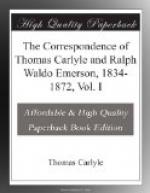I thought as I read this piece that your strange genius was the instant fruit of your London. It is the aroma of Babylon. Such as the great metropolis, such is this style: so vast, enormous, related to all the world, and so endless in details. I think you see as pictures every street, church, parliament-house, barrack, baker’s shop, mutton-stall, forge, wharf, and ship, and whatever stands, creeps, rolls, or swims thereabouts, and make all your own. Hence your encyclopediacal allusion to all knowables, and the virtues and vices of your panoramic pages. Well, it is your own; and it is English; and every word stands for somewhat; and it cheers and fortifies me. And what more can a man ask of his writing fellow-man? Why, all things; inasmuch as a good mind creates wants at every stroke.
The proof-sheet rhymes well with Mirabeau, and has abated my fears from your own and your brother’s account of the new book. I greet it well. Auspicious Babe, be born! The first good of the book is that it makes you free, and as I anxiously hope makes your body sound. A possible good is that it will cause me to see your face. But I seemed to read in Mirabeau what you intimate in your letter, that you will not come westward. Old England is to find you out, and then the New will have no charm. For me it will be the worst; for you, not. A man, a few men, cannot be to you (with your ministering eyes) that which you should travel far to find. Moreover, I observe that America looks, to those who come hither, as unromantic and unexciting as the Dutch canals. I see plainly that our Society, for the most part, is as bigoted to the respectabilities of religion and education as yours; that there is no more appetite for a revelation here than elsewhere; and the educated class are, of course, less fair-minded than others. Yet, in the moments when my eyes are open, I see that here are rich materials for the philosopher and poet, and, what is more to your purpose as an artist, that we have had in these parts no one philosopher or poet to put a sickle to the prairie wheat. I have really never believed that you would do us that crowning grace of coming hither, yet if God should be kinder to us than our belief, I meant and mean to hold you fast in my little meadows on the Musketaquid (now Concord) River, and show you (as in this country we can anywhere) an America in miniature in the April or November town meeting. Therein should you conveniently study and master the whole of our hemispherical politics reduced to a nutshell, and have a new version of Oxenstiern’s little wit; and yet be consoled by seeing that here the farmers patient as their bulls of head-boards—provided for them in relation to distant national objects, by kind editors of newspapers—do yet their will, and a good will, in their own parish. If a wise man would pass by New York, and be content to sit still in this village a few months, he should get a thorough native knowledge which no foreigner has yet acquired. So I leave you with God, and if any oracle in the great Delphos should say “Go,” why fly to us instantly. Come and spend a year with me, and see if I cannot respect your retirements.




